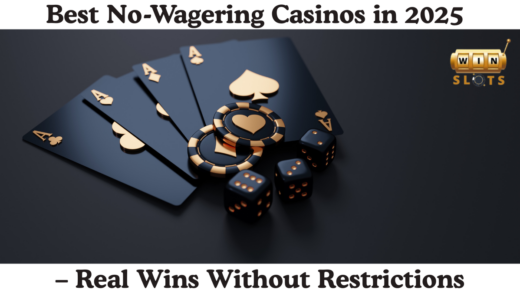Slot machines are more than just games—they’re expertly engineered experiences. Whether you’re pulling a lever at a casino or tapping a screen on your phone, the compulsion to “just play one more spin” isn’t accidental. It’s the result of deliberate design and deep psychological insight.
In this article, we unpack the slot machine psychology that keeps players coming back, diving into gambling behavior, slot triggers, and the roots of player addiction.
How Slot Machines Hijack Your Brain
Slot machines stimulate the brain’s reward center—especially the release of dopamine, the chemical associated with pleasure and motivation.
This neurotransmitter spikes not only when you win, but also when you almost win. These near-misses trick your brain into thinking success is just around the corner, even when the odds haven’t changed.
The Dopamine Trap
- Anticipation, not reward, drives behavior: The thrill often lies in the build-up, not the outcome.
- Near-wins act like real wins: Studies show near-misses light up similar brain regions as actual wins.
Whether it’s flashing lights or celebratory sounds, the psychological reinforcement makes even losing feel exciting, encouraging continued play.
Slot Triggers: Visual and Sound-Based Reinforcement
Slot machines use a range of slot triggers—colors, animations, music, and haptics—to keep users engaged. These are carefully tested to create sensory feedback loops.
Examples of Common Triggers
- Bright colors: Red and gold are most associated with luck and excitement.
- Winning sounds: Even small wins are announced with the same fanfare as jackpots.
- Vibration feedback (mobile slots): Mimics the feel of a real casino win, even on your phone.
In Vegas slots 2025, game developers use AI to personalize these triggers. If a player responds more to upbeat tunes or sudden win animations, the game adapts, customizing the experience for maximum impact.
The Illusion of Control
Many US casino slots let players choose the number of paylines or spin speed. These features make you feel more in control, even though the outcomes are random and governed by RNGs (Random Number Generators).
How the Illusion Works
- Decision-making feels strategic: Selecting bet levels or themes gives a false sense of influence.
- Autoplay and stop buttons: Provide the illusion of stopping on a win—even though results are pre-determined.
This illusion plays a powerful role in gambling behavior, convincing players their next win is a matter of skill, not chance.
Real Money Stakes and Escalating Commitment
Once money is involved, stakes become emotional. The concept of “loss chasing”—where players double down to recover their losses—is a major factor in player addiction.
It’s easy to think your luck is due to turn, especially when playing real money slots that frequently tease small wins.
The Sunk Cost Fallacy
- Players continue betting because they’ve already invested time or money.
- This leads to longer play sessions, deeper losses, and higher emotional stakes.
Games with frequent micro-wins (e.g., winning back a small portion of your bet) keep you feeling rewarded without giving you enough to cash out, prolonging the cycle.
New Trends: Vegas Slots 2025 and Gamified Addiction
The latest wave of Vegas slots 2025 are more interactive than ever. Some now resemble video games, with quests, levels, and bonus rounds.
These features tap into achievement-based motivation and competitive instincts—especially effective with younger players.
Additionally, personalized algorithms, similar to those used by social media platforms, are now embedded into many best payout slots. These systems adjust the game pace, bet suggestions, and visual design in real-time to match your behavior.
Recommendation
How to Maximize Winnings on US Slot Machines: Tips and Tricks
Monopoly Slot Machines Odds | Everything You Need to Know
What Slot Machines are Called in Australia?
What are slot machines called in Australia?
Pokies? The Shocking Truth Behind Calling Slot Machines Pokies
Final Thought
Slot machines are built on science—not just luck. Understanding slot machine psychology gives players the power to recognize the manipulative design behind the spin.
With gambling behavior being influenced by sound, visuals, and psychological triggers, staying aware is your best defense.
Whether you’re drawn to flashy real money slots or the immersive world of Vegas slots 2025, knowing what’s under the hood can help you play responsibly and avoid falling into patterns of addiction.
FAQ: Slot Machine Psychology & Player Behavior
Q1: Why do I keep playing even when I’m losing?
A1: Slot machines are designed to keep you engaged through near-misses, small wins, and sensory triggers. These keep your brain expecting a big win soon, even if it’s unlikely.
Q2: What’s a near-miss, and why does it affect me?
A2: A near-miss is when symbols almost align to win. Your brain sees this as encouragement, triggering dopamine and pushing you to keep playing.
Q3: Are mobile slots as addictive as real machines?
A3: Yes. Mobile real money slots use the same psychological tactics—visuals, sounds, and reward loops—to keep you spinning.
Q4: What are slot triggers?
A4: These are design elements like colors, sounds, and animations that reinforce gambling behavior and make the experience more immersive.
Q5: How can I play responsibly?
A5: Set time and money limits. Avoid chasing losses. Be aware of how often you’re playing and take regular breaks to stay in control.



